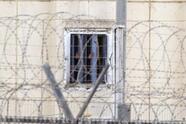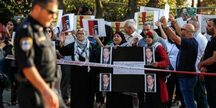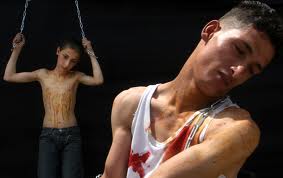2 oct 2019

Brutal treatment meted out to Samir Arbeed by Shin Bet agents has prompted strong condemnation from human rights campaigners
Last week, a Palestinian detainee arrested by Israeli occupation forces was admitted to a Jerusalem hospital suffering from severe injuries, including broken ribs and kidney failure.
Samir Arbeed, 44 and in good health when detained, had been tortured during his interrogation at the hands of Shin Bet agents. According to reports, the agents had been given permission by an Israeli “judicial body” to use “exceptional ways to investigate”.
The treatment meted out to Arbeed in custody has prompted strong condemnation from Palestinian and international human rights campaigners, with Amnesty International describing the “legally sanctioned torture” as “utterly outrageous”.
Systemic abuse
That reference to “legally sanctioned” is key. In its most recent annual report, Amnesty noted how “torture and other ill-treatment of detainees, including children, remained pervasive and was committed with impunity [by Israeli forces]”.
Other NGOs have documented the use by Israeli interrogators of physical violence, stress positions and sleep deprivation – methods deployed while the Palestinian prisoner is denied access to a lawyer. An academic study published in 2015 found that “sexual ill-treatment is systemic”.
In 2017, Haaretz reported on Israel’s torture methods as confirmed by interrogators themselves, and cited a piece published two years earlier that suggested the “use of torture was on the rise”.
Clearly, this is not just a case of “a few rotten apples”. In fact, the issue goes deeper than the actions of the individual agents, right to the heart of Israel’s institutionalised – and judicially rubber-stamped – violations of Palestinian rights and of international human rights norms.
In 1999, Israel’s top court famously ruled that Shin Bet agents could not use “physical means” against Palestinian prisoners – but that those who did so in the case of a “ticking bomb” situation would be immune from prosecution.
'Dangerous precedent'
As human rights NGO B’Tselem describes, Shin Bet agents thus continued to use methods “that constitute abuse and even torture … These methods were not limited to exceptional cases and quickly became standard interrogation policy.”
It gets worse. In December 2017, Israel’s Supreme Court rejected a petition brought by the Public Committee Against Torture in Israel (PCATI) on behalf of Palestinian prisoner Assad Abu Ghosh.
With the court taking “the state’s side on all of the key issues before it”, Judge Uri Shoham declared: “The definition of certain interrogation methods as ‘torture’ is dependent on concrete circumstances, even when these are methods recognized explicitly in international law as ‘torture’.”
The decision was slammed by the UN special rapporteur on torture as setting “a dangerous precedent” and “gravely undermining the universal prohibition of torture”.
Yet, more was to come. In a November 2018 ruling, Israel’s Supreme Court again gave its backing to the violent interrogation of Palestinian prisoner Fares Tbeish, stating that his torture by Shin Bet agents was not illegal and the perpetrators should not face prosecution.
A report in +972 Magazine described the ruling as having “broadened and effectively removed” even the limitations imposed in the 1999 court decision, with legal scholar Itamar Mann telling the news site that in the eyes of the High Court, physical abuse “is a legitimate and perhaps even the preferable way of carrying out an interrogation in cases of national security”.
Israeli impunity
It is no wonder, then, given the support for torture among Israeli officials and judges, that out of hundreds of complaints made against Shin Bet interrogators in recent years, not a single criminal investigation has been opened.
And it is in light of these precedents that one must view with scepticism the announcement by Israel’s Justice Ministry that it is launching an investigation into “potential wrongdoing” by Shin Bet agents in the case of Arbeed; no one is holding their breath for anything like meaningful accountability.
The impunity enjoyed by Israeli forces for the violent and degrading treatment of Palestinian prisoners makes international pressure and intervention essential.
On Tuesday, Palestinians protested at the International Committee of the Red Cross (ICRC) offices in Ramallah, demanding that the body exercise its right to visit Arbeed.
Prisoners’ rights groups and the Palestinian health ministry delivered a letter to the ICRC expressing their collective concern, and the ICRC said on Wednesday that it was attempting to visit Arbeed “as soon as possible”.
The torture of Arbeed shines a light on yet another way in which Israel is singled out for impunity. An ally of Western states, which benefits from multiple bilateral and multilateral agreements in trade and defence, is openly torturing prisoners detained in occupied territory – with judicial backing.
Addameer has called on the UN and its bodies “to act immediately in actual attempts to hold the Israeli occupation authorities accountable for their crimes”.
This article is available in French on Middle East Eye French edition.
Ben White
Ben White is the author of ‘Israeli Apartheid: A Beginner’s Guide’ and ‘Palestinians in Israel: Segregation, Discrimination and Democracy’. He is a writer for Middle East Monitor, and his articles have been published by Al Jazeera, al-Araby, Huffington Post, The Electronic Intifada, The Guardian, and more.
Last week, a Palestinian detainee arrested by Israeli occupation forces was admitted to a Jerusalem hospital suffering from severe injuries, including broken ribs and kidney failure.
Samir Arbeed, 44 and in good health when detained, had been tortured during his interrogation at the hands of Shin Bet agents. According to reports, the agents had been given permission by an Israeli “judicial body” to use “exceptional ways to investigate”.
The treatment meted out to Arbeed in custody has prompted strong condemnation from Palestinian and international human rights campaigners, with Amnesty International describing the “legally sanctioned torture” as “utterly outrageous”.
Systemic abuse
That reference to “legally sanctioned” is key. In its most recent annual report, Amnesty noted how “torture and other ill-treatment of detainees, including children, remained pervasive and was committed with impunity [by Israeli forces]”.
Other NGOs have documented the use by Israeli interrogators of physical violence, stress positions and sleep deprivation – methods deployed while the Palestinian prisoner is denied access to a lawyer. An academic study published in 2015 found that “sexual ill-treatment is systemic”.
In 2017, Haaretz reported on Israel’s torture methods as confirmed by interrogators themselves, and cited a piece published two years earlier that suggested the “use of torture was on the rise”.
Clearly, this is not just a case of “a few rotten apples”. In fact, the issue goes deeper than the actions of the individual agents, right to the heart of Israel’s institutionalised – and judicially rubber-stamped – violations of Palestinian rights and of international human rights norms.
In 1999, Israel’s top court famously ruled that Shin Bet agents could not use “physical means” against Palestinian prisoners – but that those who did so in the case of a “ticking bomb” situation would be immune from prosecution.
'Dangerous precedent'
As human rights NGO B’Tselem describes, Shin Bet agents thus continued to use methods “that constitute abuse and even torture … These methods were not limited to exceptional cases and quickly became standard interrogation policy.”
It gets worse. In December 2017, Israel’s Supreme Court rejected a petition brought by the Public Committee Against Torture in Israel (PCATI) on behalf of Palestinian prisoner Assad Abu Ghosh.
With the court taking “the state’s side on all of the key issues before it”, Judge Uri Shoham declared: “The definition of certain interrogation methods as ‘torture’ is dependent on concrete circumstances, even when these are methods recognized explicitly in international law as ‘torture’.”
The decision was slammed by the UN special rapporteur on torture as setting “a dangerous precedent” and “gravely undermining the universal prohibition of torture”.
Yet, more was to come. In a November 2018 ruling, Israel’s Supreme Court again gave its backing to the violent interrogation of Palestinian prisoner Fares Tbeish, stating that his torture by Shin Bet agents was not illegal and the perpetrators should not face prosecution.
A report in +972 Magazine described the ruling as having “broadened and effectively removed” even the limitations imposed in the 1999 court decision, with legal scholar Itamar Mann telling the news site that in the eyes of the High Court, physical abuse “is a legitimate and perhaps even the preferable way of carrying out an interrogation in cases of national security”.
Israeli impunity
It is no wonder, then, given the support for torture among Israeli officials and judges, that out of hundreds of complaints made against Shin Bet interrogators in recent years, not a single criminal investigation has been opened.
And it is in light of these precedents that one must view with scepticism the announcement by Israel’s Justice Ministry that it is launching an investigation into “potential wrongdoing” by Shin Bet agents in the case of Arbeed; no one is holding their breath for anything like meaningful accountability.
The impunity enjoyed by Israeli forces for the violent and degrading treatment of Palestinian prisoners makes international pressure and intervention essential.
On Tuesday, Palestinians protested at the International Committee of the Red Cross (ICRC) offices in Ramallah, demanding that the body exercise its right to visit Arbeed.
Prisoners’ rights groups and the Palestinian health ministry delivered a letter to the ICRC expressing their collective concern, and the ICRC said on Wednesday that it was attempting to visit Arbeed “as soon as possible”.
The torture of Arbeed shines a light on yet another way in which Israel is singled out for impunity. An ally of Western states, which benefits from multiple bilateral and multilateral agreements in trade and defence, is openly torturing prisoners detained in occupied territory – with judicial backing.
Addameer has called on the UN and its bodies “to act immediately in actual attempts to hold the Israeli occupation authorities accountable for their crimes”.
This article is available in French on Middle East Eye French edition.
Ben White
Ben White is the author of ‘Israeli Apartheid: A Beginner’s Guide’ and ‘Palestinians in Israel: Segregation, Discrimination and Democracy’. He is a writer for Middle East Monitor, and his articles have been published by Al Jazeera, al-Araby, Huffington Post, The Electronic Intifada, The Guardian, and more.

Palestinian protesters have marked a ‘day of rage’ over the brutal torture of a Palestinian detainee during interrogation by Israel’s domestic spy service Shin Bet, in what Amnesty International has slammed as “a reprehensible crime.”
In the occupied West bank, Israeli police attacked the protesters, using tear gas, sound bombs and rubber-coated bullets to break up the gathering on Tuesday, media reports said.
Dozens were treated for tear gas inhalation in the aftermath of the Israeli crackdown, according to the Palestinian Red Crescent.
Reuters reported up to 300 protesters took part in the demonstrations in the West Bank city of Ramallah.
Israeli forces also clashed with the protesters and activists, who gathering outside the hospital where the injured detainee is being treated in occupied East Jerusalem, arresting two protesters.
Samer al-Arbid was arrested last week on suspicion of involvement in a deadly bomb attack near an Israeli settlement northeast of the West Bank city of Ramallah.
The 44-year-old father of three was, however, hospitalized on Friday with signs of beating on his body, a fractured rib cage and severe kidney failure.
Family members and lawyers speaking to the MEE have said that al-Arbid has been tortured and beaten by Israeli forces, stating that he had fully healthy prior to his arrest.
A lawyer working for the prisoner rights organization Addameer was able to briefly visit al-Arbid in hospital on Monday. The hospitalized inmate was reported to have been unconscious and in critical condition.
In a statement on September 30, Amnesty International slammed Israel’s mistreatment of the Palestinian inmate and said, “Under international treaties, which legally bind Israel, the use of torture cannot be justified under any circumstances. This case exposes Israel’s claims that its judiciary upholds human rights as a complete sham.”
“Resorting to torture during interrogation is also a reprehensible crime,” said Saleh Higazi, Amnesty’s Deputy Middle East and North Africa director, calling on the Tel Aviv regime to end the “systematic use of torture and ensure that those responsible for the torture of Samir Arbeed, including those with command and other superior responsibility, are held to account.”
A hearing on the torture case is expected to be held in an Israeli court on Wednesday.
Palestinians and rights groups, however, doubt Israeli investigations into similar cases of mistreatment, saying such probes are a sham and serve public relations purposes.
More than 7,000 Palestinians are reportedly held in Israeli jails.
According to Addameer, 220 Palestinians have died in Israeli detention since 1967. The rights group says 60 of them lost their lives due to medical negligence, while 73 people have died as a result of torture.
Amnesty International: “Legally-sanctioned torture of Palestinian detainee left him in critical condition”
Amnesty International: The legally-sanctioned torture of a Palestinian detainee during interrogation by officers from Shin Bet, Israel’s Security Agency, further exposes the complicity of Israel’s authorities, including its judiciary, in the systematic violation of the human right to be free from torture, said Amnesty International today.
Samir Arbeed was arrested on 25 September on suspicion of being involved in the killing of a 17-year-old Israeli girl Rina Shnerb.
According to Israeli media reports and Samir’s lawyer, a “judicial body” granted Shin Bet special permission to “use exceptional ways to investigate” in his case, effectively sanctioning the use of methods amounting to torture during his interrogation.
“It is utterly outrageous that the use of torture during interrogations continues to be sanctioned by the Israeli authorities, from the Shin Bet, through the executive branch and all the way to the Supreme Court,” said Saleh Higazi, Amnesty International’s Deputy Middle East and North Africa Director.
“Under international treaties, which legally bind Israel, the use of torture cannot be justified under any circumstances. This case exposes Israel’s claims that its judiciary upholds human rights as a complete sham.”
The use of torture cannot be justified under any circumstances. This case exposes Israel’s claims that its judiciary upholds human rights as a complete sham
Saleh Higazi, Amnesty InternationalUpon his arrest, Samir Arbeed was badly beaten by the Israeli forces and then tortured during interrogation.
According to his lawyer, Mahmoud Hassan of the Addameer rights group, Samir Arbeed appeared in the Ofer military court on 26 September with visible bruises and told the judge he was in pain and unable to eat. Despite this, the torture continued. On 28 September Samir Arbeed was transferred to hospital after losing consciousness. He was admitted with broken ribs and kidney failure and is currently in critical condition on a respirator.
In 1999, Israel’s Supreme Court ruled that while torture and other ill-treatment were generally prohibited, Shin Bet interrogators who used what the Court described as “physical interrogation methods” in “ticking time-bomb” situations may be exempted from criminal prosecution or even investigation.
Since then, Shin Bet interrogators have tortured hundreds of Palestinians, citing the “ticking bomb” plea, and not one of them has been prosecuted.
“Targeting civilians and killing them is a war crime. There is no doubt that those who perpetrate such killings and other abuses should be held accountable for their actions. But resorting to torture during interrogation is also a reprehensible crime,” said Saleh Higazi.
“Israel’s authorities must end their systematic use of torture and ensure that those responsible for the torture of Samir Arbeed, including those with command and other superior responsibility, are held to account.”
The Israeli Justice Ministry has launched an investigation into Samir Arbeed’s torture and will examine how his interrogation was conducted and what level of violence was used.
“Claims of ‘ticking time-bombs’ are totally irrelevant to investigations into torture, which is prohibited absolutely. Such claims must therefore play no part in decisions to prosecute,” said Saleh Higazi.
Background
Samir Arbeed, a member of the Popular Front for the Liberation of Palestine (PFLP), was first arrested by Shin Bet on 26 August, along with three others, in connection with the murder of Rina Shnerb near the West Bank settlement of Dolev on 23 August. On 2 September, the Ofer military court issued a three-month administrative detention order against him, but during a later hearing, the court ordered his release.
On 25 September a special unit of Israeli forces rearrested Samir Arbeed, beating him during the arrest. He was taken to the Shin Bet’s interrogation center at the Russian Compound in Jerusalem and denied access to his lawyer. On 28 September he was transferred to a hospital in West Jerusalem.
Activists seal off ICRC’s Ramallah office in solidarity with detainee tortured by Israel
Several Palestinian activists today sealed off the office of the International Committee of the Red Cross (ICRC) in the West Bank city of Ramallah in solidarity with Samir Arbeed, who was tortured by Israeli interrogators and is currently in critical condition in an Israeli hospital in Jerusalem. video
WAFA correspondent said the activists shut the doors of the ICRC offices and prevented its staff from entering them. They demanded immediate intervention by the ICRC to save Arbeed’s life, to visit him in hospital to check on his situation and to investigate the torture he underwent.
Arbeed was detained on September 25 while heading home with his wife and was subjected to severe torture and beatings during his arrest and interrogation, which caused him pulmonary hemorrhage, several broken ribs and marks all over his body as well as severe kidney failure.
He was rushed to the Hadassah hospital in Israel after suffering serious health deterioration due to torture and ill-treatment during interrogations.
Minster of Health, Mai Kaila, demanded the ICRC to pressure the Israeli authorities to allow a Palestinian medical team to visit Arbeed in hospital to check on his health condition.
In the occupied West bank, Israeli police attacked the protesters, using tear gas, sound bombs and rubber-coated bullets to break up the gathering on Tuesday, media reports said.
Dozens were treated for tear gas inhalation in the aftermath of the Israeli crackdown, according to the Palestinian Red Crescent.
Reuters reported up to 300 protesters took part in the demonstrations in the West Bank city of Ramallah.
Israeli forces also clashed with the protesters and activists, who gathering outside the hospital where the injured detainee is being treated in occupied East Jerusalem, arresting two protesters.
Samer al-Arbid was arrested last week on suspicion of involvement in a deadly bomb attack near an Israeli settlement northeast of the West Bank city of Ramallah.
The 44-year-old father of three was, however, hospitalized on Friday with signs of beating on his body, a fractured rib cage and severe kidney failure.
Family members and lawyers speaking to the MEE have said that al-Arbid has been tortured and beaten by Israeli forces, stating that he had fully healthy prior to his arrest.
A lawyer working for the prisoner rights organization Addameer was able to briefly visit al-Arbid in hospital on Monday. The hospitalized inmate was reported to have been unconscious and in critical condition.
In a statement on September 30, Amnesty International slammed Israel’s mistreatment of the Palestinian inmate and said, “Under international treaties, which legally bind Israel, the use of torture cannot be justified under any circumstances. This case exposes Israel’s claims that its judiciary upholds human rights as a complete sham.”
“Resorting to torture during interrogation is also a reprehensible crime,” said Saleh Higazi, Amnesty’s Deputy Middle East and North Africa director, calling on the Tel Aviv regime to end the “systematic use of torture and ensure that those responsible for the torture of Samir Arbeed, including those with command and other superior responsibility, are held to account.”
A hearing on the torture case is expected to be held in an Israeli court on Wednesday.
Palestinians and rights groups, however, doubt Israeli investigations into similar cases of mistreatment, saying such probes are a sham and serve public relations purposes.
More than 7,000 Palestinians are reportedly held in Israeli jails.
According to Addameer, 220 Palestinians have died in Israeli detention since 1967. The rights group says 60 of them lost their lives due to medical negligence, while 73 people have died as a result of torture.
Amnesty International: “Legally-sanctioned torture of Palestinian detainee left him in critical condition”
Amnesty International: The legally-sanctioned torture of a Palestinian detainee during interrogation by officers from Shin Bet, Israel’s Security Agency, further exposes the complicity of Israel’s authorities, including its judiciary, in the systematic violation of the human right to be free from torture, said Amnesty International today.
Samir Arbeed was arrested on 25 September on suspicion of being involved in the killing of a 17-year-old Israeli girl Rina Shnerb.
According to Israeli media reports and Samir’s lawyer, a “judicial body” granted Shin Bet special permission to “use exceptional ways to investigate” in his case, effectively sanctioning the use of methods amounting to torture during his interrogation.
“It is utterly outrageous that the use of torture during interrogations continues to be sanctioned by the Israeli authorities, from the Shin Bet, through the executive branch and all the way to the Supreme Court,” said Saleh Higazi, Amnesty International’s Deputy Middle East and North Africa Director.
“Under international treaties, which legally bind Israel, the use of torture cannot be justified under any circumstances. This case exposes Israel’s claims that its judiciary upholds human rights as a complete sham.”
The use of torture cannot be justified under any circumstances. This case exposes Israel’s claims that its judiciary upholds human rights as a complete sham
Saleh Higazi, Amnesty InternationalUpon his arrest, Samir Arbeed was badly beaten by the Israeli forces and then tortured during interrogation.
According to his lawyer, Mahmoud Hassan of the Addameer rights group, Samir Arbeed appeared in the Ofer military court on 26 September with visible bruises and told the judge he was in pain and unable to eat. Despite this, the torture continued. On 28 September Samir Arbeed was transferred to hospital after losing consciousness. He was admitted with broken ribs and kidney failure and is currently in critical condition on a respirator.
In 1999, Israel’s Supreme Court ruled that while torture and other ill-treatment were generally prohibited, Shin Bet interrogators who used what the Court described as “physical interrogation methods” in “ticking time-bomb” situations may be exempted from criminal prosecution or even investigation.
Since then, Shin Bet interrogators have tortured hundreds of Palestinians, citing the “ticking bomb” plea, and not one of them has been prosecuted.
“Targeting civilians and killing them is a war crime. There is no doubt that those who perpetrate such killings and other abuses should be held accountable for their actions. But resorting to torture during interrogation is also a reprehensible crime,” said Saleh Higazi.
“Israel’s authorities must end their systematic use of torture and ensure that those responsible for the torture of Samir Arbeed, including those with command and other superior responsibility, are held to account.”
The Israeli Justice Ministry has launched an investigation into Samir Arbeed’s torture and will examine how his interrogation was conducted and what level of violence was used.
“Claims of ‘ticking time-bombs’ are totally irrelevant to investigations into torture, which is prohibited absolutely. Such claims must therefore play no part in decisions to prosecute,” said Saleh Higazi.
Background
Samir Arbeed, a member of the Popular Front for the Liberation of Palestine (PFLP), was first arrested by Shin Bet on 26 August, along with three others, in connection with the murder of Rina Shnerb near the West Bank settlement of Dolev on 23 August. On 2 September, the Ofer military court issued a three-month administrative detention order against him, but during a later hearing, the court ordered his release.
On 25 September a special unit of Israeli forces rearrested Samir Arbeed, beating him during the arrest. He was taken to the Shin Bet’s interrogation center at the Russian Compound in Jerusalem and denied access to his lawyer. On 28 September he was transferred to a hospital in West Jerusalem.
Activists seal off ICRC’s Ramallah office in solidarity with detainee tortured by Israel
Several Palestinian activists today sealed off the office of the International Committee of the Red Cross (ICRC) in the West Bank city of Ramallah in solidarity with Samir Arbeed, who was tortured by Israeli interrogators and is currently in critical condition in an Israeli hospital in Jerusalem. video
WAFA correspondent said the activists shut the doors of the ICRC offices and prevented its staff from entering them. They demanded immediate intervention by the ICRC to save Arbeed’s life, to visit him in hospital to check on his situation and to investigate the torture he underwent.
Arbeed was detained on September 25 while heading home with his wife and was subjected to severe torture and beatings during his arrest and interrogation, which caused him pulmonary hemorrhage, several broken ribs and marks all over his body as well as severe kidney failure.
He was rushed to the Hadassah hospital in Israel after suffering serious health deterioration due to torture and ill-treatment during interrogations.
Minster of Health, Mai Kaila, demanded the ICRC to pressure the Israeli authorities to allow a Palestinian medical team to visit Arbeed in hospital to check on his health condition.

The Palestinian NGOs Network and the Palestinian Human Rights Organizations Council have called on the Red Cross to delegate a medical commission to investigate the exposure of prisoner Samer Arabeed to torture by Israeli interrogators.
In a joint statement, the human rights groups held the Israeli occupation state fully responsible for the life of prisoner Arabeed following confirmed reports about his exposure to severe torture.
They stressed that what happened to Arabeed was a crime and an attempt to liquidate him.
Arabeed, 44, was kidnaped by Israeli forces on September 25 from outside his workplace in Ramallah city.
According to his wife, Arabeed was brutally beaten and abused when he was arrested by Israeli soldiers before transferring him to the Maskubiya detention center, where he underwent sessions of extreme torture by interrogators.
A few days later, he was transferred in serious condition to Hadassah Hospital, where medical sources said he was in a coma and dependent on a ventilator and a dialysis machine.
In a joint statement, the human rights groups held the Israeli occupation state fully responsible for the life of prisoner Arabeed following confirmed reports about his exposure to severe torture.
They stressed that what happened to Arabeed was a crime and an attempt to liquidate him.
Arabeed, 44, was kidnaped by Israeli forces on September 25 from outside his workplace in Ramallah city.
According to his wife, Arabeed was brutally beaten and abused when he was arrested by Israeli soldiers before transferring him to the Maskubiya detention center, where he underwent sessions of extreme torture by interrogators.
A few days later, he was transferred in serious condition to Hadassah Hospital, where medical sources said he was in a coma and dependent on a ventilator and a dialysis machine.
1 oct 2019
|
|
The Israeli occupation forces on Tuesday evening attacked a Palestinian protest near Hadassah Hospital in Occupied Jerusalem where the Palestinian detainee Samer al-Arabeed, who is currently in a coma after being beaten by Israeli interrogators, is held.
The Israeli forces violently assaulted the Palestinian protesters and arrested two of them. video video Dozens of Palestinian activists staged a sit-in in Jerusalem in solidarity with al-Arabeed and in protest at the aggressive policies pursued against Palestinian prisoners in Israeli jails. video The activists stressed that al-Arabeed needs urgent and real medical treatment, pointing out that the Israel Prison Service is not offering him the medical care his condition requires. |
They also demanded that all Israeli interrogators who assaulted him be tried.
29 sept 2019

Addameer Association for Prisoner Support and Human Rights has affirmed that the health condition of Palestinian prisoner Samer al-Arabeed, 44, has seriously declined as a result of his exposure to physical torture by Israeli interrogators.
According to Addameer, Arabeed was transferred to hospital after he suffered multiple fractures and lost his consciousness during his exposure to severe torture at the hands of Israeli interrogators at the Maskubiya detention center in west Jerusalem.
Addameer has held the Israeli occupation authority fully responsible for the life of Arabeed and called for releasing him immediately in order for him to receive proper medical treatment.
The Israeli intelligence has accused Arabeed and other detainees of being involved in the bombing attack in Ein Bubin area, a spring in the wooded hills near the illegal settlement of Dolev, on August 23, 2019.
PCHR Holds Israel Responsible for Life of Prisoner Samer al-‘Arbid
Today morning, 29 September 2019, The Palestinian Prisoner Samer al-‘Arbid was referred to Hadassah Hospital in Jerusalem due to the serious deterioration of his health condition while being interrogated by the Israeli Security Agency (Shin Bet) in the Moscovia Prison in occupied Jerusalem.The Palestinian Center for Human Rights (PCHR) holds Israel fully responsible for the life of al-‘Arbid and calls upon the international community to pressurize Israel to end torture in its prisons and detention centers.
It should be noted that the Israeli authorities raided and searched the house of Samer Mina al-‘Arbid in Batn al-Hawa neighborhood in Ramallah on Wednesday, 25 September 2019.
He was arrested and then, according to the Israeli media and Shin Bet sources, taken to the Moscovia Prison, where he was interrogated on suspicions of carrying out the “Dolev” Settlement attack, west of Ramallah, which took place on 23 August and resulted in the killing of a female settler and injury of 2 other settlers.
Al-Arbid Family said that Samer was in a good health condition before being arrested, adding that the Israeli soldiers beat him during his arrest.
Israeli media stated that the person mainly accused of carrying out the attack was interrogated by the Shin Bet and then referred to hospital in a critical health condition. According to the media, Shin Bet was given legal permission to employ “extraordinary measures” in its interrogation of ‘Arbid.
Haaretz newspaper reported on its website this morning that the Shin Bet issued a statement saying that the investigator informed that ‘Arbid was not feeling well. And, in accordance with protocol, he was taken for medical checks and treatment at the hospital.
PCHR pointed out that Israel has many precedents, proving Israeli security’s involvement in torture against dozens of prisoners as part of an Israeli systematic policy and under legal cover. The latest of which was the death of Nassar Majed Taqatqah (31), from Bethlehem, while in solitary confinement in “Nitzan” Prison (al-Ramlah) on 19 June 2019, noting that he died during interrogation and only a month after his arrest.
PCHR stresses that torture is an unjustified international crime and considers combating it as an international obligation under the 1984 Convention Against Torture (CAT) and customary international law.
Article (2) of Cat stipulates that: “Each State Party shall take effective legislative, administrative, judicial or other measures to prevent acts of torture in any territory under its jurisdiction.” The second paragraph of the same Article emphasizes that: “No exceptional circumstances whatsoever, whether a state of war or a threat of war, internal political instability or any other public emergency, may be invoked as a justification of torture.”
PCHR calls upon the international bodies to open immediate and impartial inquiry into suspicions that al-‘Arabid have been tortured during investigation, noting that he did not suffer any health problems before detention.
It should be noted that PCHR sent on 04 April 2019 a submission to the Special Rapporteur on the situation of human rights in the Palestinian Territory occupied since 1967 and to the Working Group on Arbitrary Detention. The submission was about the statements on 30 March 2019 by “Gelad Ardan”, the Israeli Interior Security Minister, threatening that there will be no negotiations with the Palestinian prisoners if they go on a hunger strike that was supposed to start on 07 April 2019.
Public Document
**************************************
Follow PCHR on Facebook and Twitter
For more information, please call PCHR office in Gaza, Gaza Strip, on +972 8 2824776 – 2825893
Gaza- Jamal ‘Abdel Nasser “al-Thalathini” Street – Al-Roya Building- Floor 12 , El Remal, PO Box 1328 Gaza, Gaza Strip. E-mail: [email protected], Webpage http://www.pchrgaza.org
According to Addameer, Arabeed was transferred to hospital after he suffered multiple fractures and lost his consciousness during his exposure to severe torture at the hands of Israeli interrogators at the Maskubiya detention center in west Jerusalem.
Addameer has held the Israeli occupation authority fully responsible for the life of Arabeed and called for releasing him immediately in order for him to receive proper medical treatment.
The Israeli intelligence has accused Arabeed and other detainees of being involved in the bombing attack in Ein Bubin area, a spring in the wooded hills near the illegal settlement of Dolev, on August 23, 2019.
PCHR Holds Israel Responsible for Life of Prisoner Samer al-‘Arbid
Today morning, 29 September 2019, The Palestinian Prisoner Samer al-‘Arbid was referred to Hadassah Hospital in Jerusalem due to the serious deterioration of his health condition while being interrogated by the Israeli Security Agency (Shin Bet) in the Moscovia Prison in occupied Jerusalem.The Palestinian Center for Human Rights (PCHR) holds Israel fully responsible for the life of al-‘Arbid and calls upon the international community to pressurize Israel to end torture in its prisons and detention centers.
It should be noted that the Israeli authorities raided and searched the house of Samer Mina al-‘Arbid in Batn al-Hawa neighborhood in Ramallah on Wednesday, 25 September 2019.
He was arrested and then, according to the Israeli media and Shin Bet sources, taken to the Moscovia Prison, where he was interrogated on suspicions of carrying out the “Dolev” Settlement attack, west of Ramallah, which took place on 23 August and resulted in the killing of a female settler and injury of 2 other settlers.
Al-Arbid Family said that Samer was in a good health condition before being arrested, adding that the Israeli soldiers beat him during his arrest.
Israeli media stated that the person mainly accused of carrying out the attack was interrogated by the Shin Bet and then referred to hospital in a critical health condition. According to the media, Shin Bet was given legal permission to employ “extraordinary measures” in its interrogation of ‘Arbid.
Haaretz newspaper reported on its website this morning that the Shin Bet issued a statement saying that the investigator informed that ‘Arbid was not feeling well. And, in accordance with protocol, he was taken for medical checks and treatment at the hospital.
PCHR pointed out that Israel has many precedents, proving Israeli security’s involvement in torture against dozens of prisoners as part of an Israeli systematic policy and under legal cover. The latest of which was the death of Nassar Majed Taqatqah (31), from Bethlehem, while in solitary confinement in “Nitzan” Prison (al-Ramlah) on 19 June 2019, noting that he died during interrogation and only a month after his arrest.
PCHR stresses that torture is an unjustified international crime and considers combating it as an international obligation under the 1984 Convention Against Torture (CAT) and customary international law.
Article (2) of Cat stipulates that: “Each State Party shall take effective legislative, administrative, judicial or other measures to prevent acts of torture in any territory under its jurisdiction.” The second paragraph of the same Article emphasizes that: “No exceptional circumstances whatsoever, whether a state of war or a threat of war, internal political instability or any other public emergency, may be invoked as a justification of torture.”
PCHR calls upon the international bodies to open immediate and impartial inquiry into suspicions that al-‘Arabid have been tortured during investigation, noting that he did not suffer any health problems before detention.
It should be noted that PCHR sent on 04 April 2019 a submission to the Special Rapporteur on the situation of human rights in the Palestinian Territory occupied since 1967 and to the Working Group on Arbitrary Detention. The submission was about the statements on 30 March 2019 by “Gelad Ardan”, the Israeli Interior Security Minister, threatening that there will be no negotiations with the Palestinian prisoners if they go on a hunger strike that was supposed to start on 07 April 2019.
Public Document
**************************************
Follow PCHR on Facebook and Twitter
For more information, please call PCHR office in Gaza, Gaza Strip, on +972 8 2824776 – 2825893
Gaza- Jamal ‘Abdel Nasser “al-Thalathini” Street – Al-Roya Building- Floor 12 , El Remal, PO Box 1328 Gaza, Gaza Strip. E-mail: [email protected], Webpage http://www.pchrgaza.org

The Israeli Internal Security Agency has reported that it arrested four Palestinians, allegedly involved in the killing of an Israeli teenage girl in Ein Bonin, west of the central West Bank city of Ramallah, on August 23, 2019.
The agency said the four Palestinians are Samer Mina Salim ‘Arbeed, 44, from Ramallah, Qassem Abdul-Karim Shibli, 25, Yazan Hussein Mijmas, 25, and Nizam Sami Awlad Mohammad, 21, from the nearby city of Birzeit.
The Israeli Agency claimed that the cell, headed by Samer Arbeed, also planned other attacks, including shootings and abduction of Israeli soldiers and colonists.
It also said that the abducted Palestinians also had an explosive charge, which they surrendered to the army, and that they were planning to use it against army vehicles.
Israeli daily Haaretz has reported that Arbeed, 44, is reportedly the head of the cell that carried the attack out in August of this year, and added that the Palestinian was moved to an Israeli hospital in a life-threatening health condition after being “interrogated” by the Shin Bet Security Agency.
It added that the man was first arrested and later released when the prosecutor’s office could not extend his remand but was rearrested this past week after the agency “received information that he held explosives.”
Haaretz also quoted his attorney stating that he was healthy prior to his abduction and “interrogation”, and that the Police only said that he was moved to a hospital, without providing any reasons or details of the conditions which led to him being in a serious health condition.
The Israeli teen who was killed in the incident has been identified as Rina Shnerb, 17, from Lod city; her brother Dvir, 19, suffered serious wounds, and her father Eitan, 46, was mildly injured, when an improvised explosive went off near them while they were hiking near a spring northwest of Ramallah.
Palestinian detainee moved to hospital after brutal torture
Palestinian detainee in Israeli jails, Samer Arbid, has recently been moved to hospital after he was mercilessly tortured during his interrogation by Israeli authorities, the Prisoner Support and Human Rights Association (Addameer) reported today.
Arbid, who Israel accuses of spearheading an attack which killed an illegal Israeli settler near Ramallah in August, has been hospitalized in critical condition after undergoing interrogations with Israel's Shin Bet security service.
His attorneys have said that he was healthy when he was arrested, but the authorities notified them he had been transferred to the hospital without specifying the reasons.
Arbid was arrested by the Israeli army during a raid of the West Bank city of Ramallah last week.
The agency said the four Palestinians are Samer Mina Salim ‘Arbeed, 44, from Ramallah, Qassem Abdul-Karim Shibli, 25, Yazan Hussein Mijmas, 25, and Nizam Sami Awlad Mohammad, 21, from the nearby city of Birzeit.
The Israeli Agency claimed that the cell, headed by Samer Arbeed, also planned other attacks, including shootings and abduction of Israeli soldiers and colonists.
It also said that the abducted Palestinians also had an explosive charge, which they surrendered to the army, and that they were planning to use it against army vehicles.
Israeli daily Haaretz has reported that Arbeed, 44, is reportedly the head of the cell that carried the attack out in August of this year, and added that the Palestinian was moved to an Israeli hospital in a life-threatening health condition after being “interrogated” by the Shin Bet Security Agency.
It added that the man was first arrested and later released when the prosecutor’s office could not extend his remand but was rearrested this past week after the agency “received information that he held explosives.”
Haaretz also quoted his attorney stating that he was healthy prior to his abduction and “interrogation”, and that the Police only said that he was moved to a hospital, without providing any reasons or details of the conditions which led to him being in a serious health condition.
The Israeli teen who was killed in the incident has been identified as Rina Shnerb, 17, from Lod city; her brother Dvir, 19, suffered serious wounds, and her father Eitan, 46, was mildly injured, when an improvised explosive went off near them while they were hiking near a spring northwest of Ramallah.
Palestinian detainee moved to hospital after brutal torture
Palestinian detainee in Israeli jails, Samer Arbid, has recently been moved to hospital after he was mercilessly tortured during his interrogation by Israeli authorities, the Prisoner Support and Human Rights Association (Addameer) reported today.
Arbid, who Israel accuses of spearheading an attack which killed an illegal Israeli settler near Ramallah in August, has been hospitalized in critical condition after undergoing interrogations with Israel's Shin Bet security service.
His attorneys have said that he was healthy when he was arrested, but the authorities notified them he had been transferred to the hospital without specifying the reasons.
Arbid was arrested by the Israeli army during a raid of the West Bank city of Ramallah last week.
Page: 2 - 1


